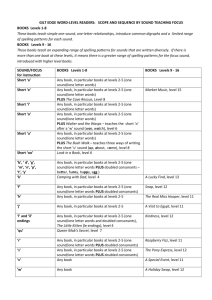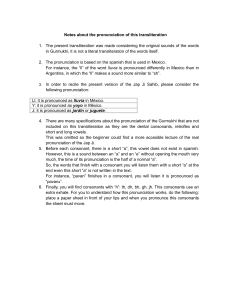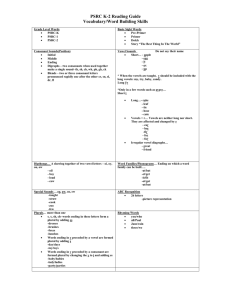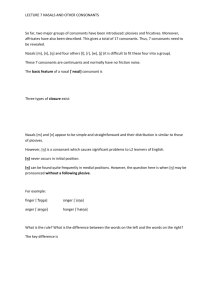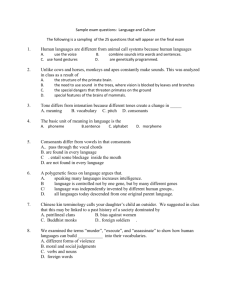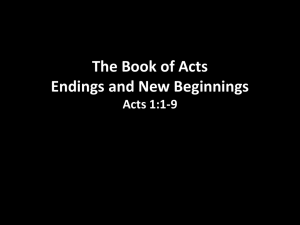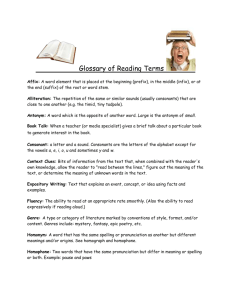Consonants
advertisement
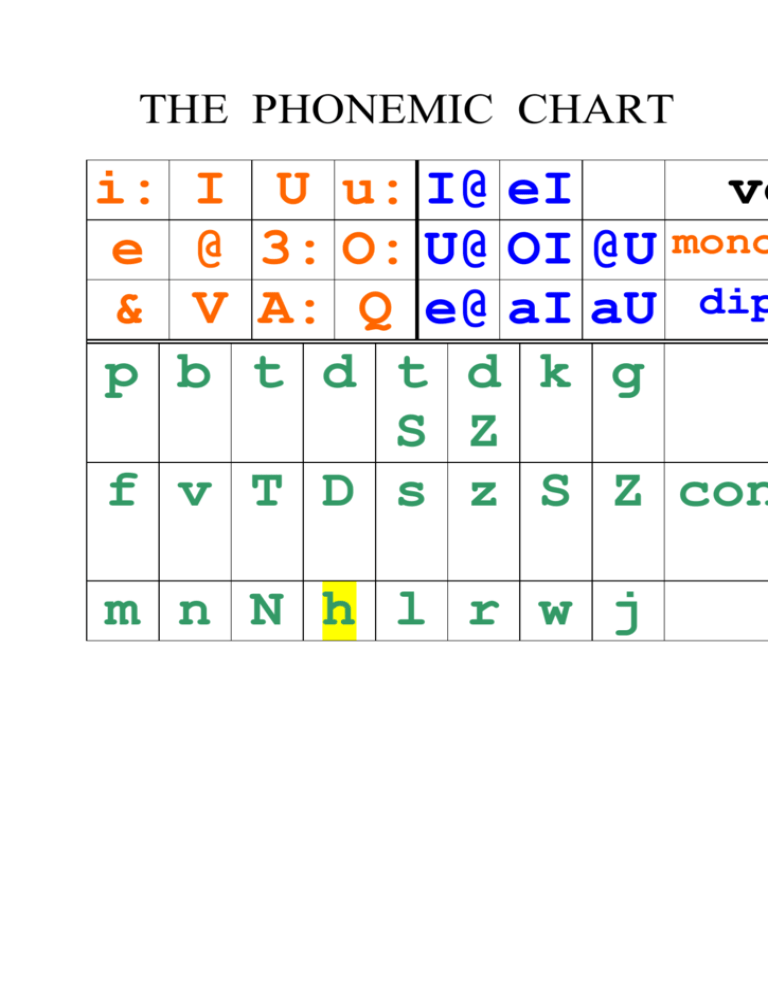
THE PHONEMIC CHART i: I e @ & V p b U u: I@ eI vo 3: O: U@ OI @U mono A: Q e@ aI aU dip t d t d k g S Z f v T D s z S Z con m n N h l r w j Consonants – their classification A. English consonants may be classified by the manner of articulation and by the place of articulation. a) By the manner of articulation as plosives: fricatives: affricates: nasals: liquids (the lateral:… and the post alveolar approximant:… ) semivowels b) By the place of articulation as labials: bilabials (lips): labiodentals (lips and teeth): dentals (teeth): alveolars (gums): including the postalveolar r palatals (palate): velars (soft palate): glottal (glottis): B. Consonants may be classified as voiced and unvoiced/voiceless. p b t d t S f v T D s m n N h l d k g Z z S Z r w j Voiced consonants are: Unvoiced consonants are: Pronunciation of voiced consonants at the end of English words lag vs lack dog vs dock clog vs clock pig vs pick C. Aspirated [ph, th, kh] listen to Peter Piper tongue twister, Which phonemes get aspirated? D. Comparison with the Czech system of consonants 1. Which ones are missing in Czech? 2. Which ones are part of the Czech system but not part of the English one? E. Problematic consonants for Czech learners The most relevant and frequent errors of Czech learners Consonants: /d/ instead of /D/, /f/ instead of /T/ /v/ instead of /w/ /ng/ instead of /N/ Aspiration of /p/, /t/, /k/ voiced consonants at the end of a word are pronounced as unvoiced /Í/, /Ù/ /r/ is strongly trilled /h/ is voiced Tasks to practise grammatical endings Task 1 Consider pronunciation of adjectives ending in –ed in these sentences. Put them under the proper heading according to the pronunciation of –ed. Example: She’s interested in you. I’m not used to going home late. [t] [d] shocked bored embarrassed worried [Id] disappointed disgusted needed [t] [Id] [d] embarrassed bored shocked worried disgusted disappointed Task 2 Look at this table and complete the rules. 1. When the –ed ending follows the phoneme [t] or [d] at the end of the word, it is pronounced …………. 2. When the –ed ending follows a voiceless consonant (= p, k, f, s, T, S, Í) apart from [t] at the end of the word, it is pronounced …………. 3. When the –ed ending follows either a vowel or a voiced consonant (= b, g, v, z, D, Z, Ù, m, n, r, l, j) apart from [d] at the end of the word, it is pronounced …………. Practical implications of correct pronunciation of grammatical endings? 1. plural endings –s, es (e.g. dogs, buses, books) verb endings –s, es (e.g. stops, watches, opens) possessive case -’s (e.g. brother’s books) When to pronounce these endings as [s], [z], or [Iz]? 2. –ed endings in verbs (e.g. wanted, stopped, judged) –ed endings in adjectives (e.g. interested, bored, emrarrased) When to pronounce these endings as [t], [d], or [Id]? Task 3 You can prepare a parallel table which will be true for –s, -es endings. [t] [d] [Id] [s] books tips [z] nouns cars [Iz] dresses watches Task 4 Sort out these words into columns according to the proper pronunciation of –s, -es endings. You can formulate parallel rules which will be true for –s, -es endings. 1. When the –s, -es ending follows the phonemes [s, z, S, Z, Í, Ù] at the end of the word, it is pronounced …………. The phonemes [s, z, S, Z, Í, Ù] are called sibilants. 2. When the –s, -es ending follows a voiceless consonant (= p, k, t, f, T) apart from [s, S, Í] at the end of the word, it is pronounced …………. 3. When the –s, -es ending follows either a vowel or a voiced consonant (= b, g, v, D, d, m, n, r, l, j) apart from [z, Z, Ù] at the end of the word, it is pronounced …………. Task 5 Check the pronunciation of the endings and meaning of these adjectives in the dictionary as the exceptions exist. naked ragged wicked rugged beloved jagged Task 6 Sort out any 10 verbs in the regular past form according to the pronunciation of –ed. [t] [d] [Id] Task 7 Spot the Odd one out in these groups of verbs: 1. 2. 3. 4. opened needed watched judged closed hated hopped signed washed rained hoped averaged remembered patted jumped practised Task 8 Prepare similar Odd one out tasks to practise a) plural noun endings (3 lines) b) verbs endings in –s, -es (3 lines) c) verbs endings in -ed (3 lines) robbed wanted grained achieved
